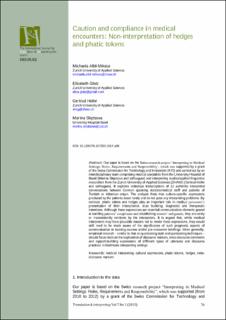Please use this identifier to cite or link to this item:
https://doi.org/10.21256/zhaw-4060Full metadata record
| DC Field | Value | Language |
|---|---|---|
| dc.contributor.author | Albl-Mikasa, Michaela | - |
| dc.contributor.author | Glatz, Elisabeth | - |
| dc.contributor.author | Hofer, Gertrud | - |
| dc.contributor.author | Sleptsova, Marina | - |
| dc.date.accessioned | 2018-01-31T13:17:00Z | - |
| dc.date.available | 2018-01-31T13:17:00Z | - |
| dc.date.issued | 2015 | - |
| dc.identifier.issn | 1836-9324 | de_CH |
| dc.identifier.uri | https://digitalcollection.zhaw.ch/handle/11475/2370 | - |
| dc.description.abstract | The paper is based on the Swiss research project ‘Interpreting in Medical Settings: Roles, Requirements and Responsibility’, which was supported by a grant of the Swiss Commission for Technology and Innovation (KTI) and carried out by an interdisciplinary team comprising medical specialists from the University Hospital of Basel (Marina Sleptsova and colleagues) and interpreting studies/applied linguistics researchers from the Zurich University of Applied Sciences (ZHAW) (Gertrud Hofer and colleagues). It explores 12 transcribed video-taped interpreted authentic conversations between German speaking doctors/medical staff and patients of Turkish or Albanian origin. The analysis finds that culture-specific expressions produced by the patients occur rarely and do not pose any interpreting problems. By contrast, phatic tokens and hedges play an important role in medical personnel’s presentation of their interactional, trust building, diagnostic and therapeutic intentions. Although essential elements in communication in that they are geared at building patients’ compliance and establishing doctors’ safeguards, these expressions are rarely or inconsistently rendered by the interpreters. It is argued that, while medical interpreters may have plausible reasons not to render these expressions, they would still need to be made aware of the significance of such pragmatic aspects of communication in training courses and/or pre-encounter briefings. More generally, empirical research – similar to that on questioning style and questioning techniques – should focus more on the exploration of discourse markers, meta-discourse comments and rapport-building expressions of different types of utterance and discourse practices in healthcare interpreting settings. | de_CH |
| dc.language.iso | en | de_CH |
| dc.publisher | University of Western Sydney | de_CH |
| dc.relation.ispartof | Translation & Interpreting | de_CH |
| dc.rights | https://creativecommons.org/licenses/by/4.0/ | de_CH |
| dc.subject | Cultural expressions | de_CH |
| dc.subject | Hedges | de_CH |
| dc.subject | Phatic tokens | de_CH |
| dc.subject | Medical interpreting | de_CH |
| dc.subject.ddc | 418.02: Translationswissenschaft | de_CH |
| dc.title | Caution and compliance in medical encounters : non-interpretation of hedges and phatic tokens | de_CH |
| dc.type | Beitrag in wissenschaftlicher Zeitschrift | de_CH |
| dcterms.type | Text | de_CH |
| zhaw.departement | Angewandte Linguistik | de_CH |
| zhaw.organisationalunit | Institut für Übersetzen und Dolmetschen (IUED) | de_CH |
| zhaw.publisher.place | Sydney | de_CH |
| dc.identifier.doi | 10.21256/zhaw-4060 | - |
| zhaw.funding.eu | No | de_CH |
| zhaw.issue | 3 | de_CH |
| zhaw.originated.zhaw | Yes | de_CH |
| zhaw.pages.end | 89 | de_CH |
| zhaw.pages.start | 76 | de_CH |
| zhaw.publication.status | publishedVersion | de_CH |
| zhaw.volume | 7 | de_CH |
| zhaw.publication.review | Peer review (Publikation) | de_CH |
| zhaw.webfeed | Dolmetschwissenschaft | de_CH |
| Appears in collections: | Publikationen Angewandte Linguistik | |
Files in This Item:
| File | Description | Size | Format | |
|---|---|---|---|---|
| 2015_Alb-Mikasa_Caution and compliance_Trans&Int.pdf | 609.47 kB | Adobe PDF |  View/Open |
Show simple item record
Albl-Mikasa, M., Glatz, E., Hofer, G., & Sleptsova, M. (2015). Caution and compliance in medical encounters : non-interpretation of hedges and phatic tokens. Translation & Interpreting, 7(3), 76–89. https://doi.org/10.21256/zhaw-4060
Albl-Mikasa, M. et al. (2015) ‘Caution and compliance in medical encounters : non-interpretation of hedges and phatic tokens’, Translation & Interpreting, 7(3), pp. 76–89. Available at: https://doi.org/10.21256/zhaw-4060.
M. Albl-Mikasa, E. Glatz, G. Hofer, and M. Sleptsova, “Caution and compliance in medical encounters : non-interpretation of hedges and phatic tokens,” Translation & Interpreting, vol. 7, no. 3, pp. 76–89, 2015, doi: 10.21256/zhaw-4060.
ALBL-MIKASA, Michaela, Elisabeth GLATZ, Gertrud HOFER und Marina SLEPTSOVA, 2015. Caution and compliance in medical encounters : non-interpretation of hedges and phatic tokens. Translation & Interpreting. 2015. Bd. 7, Nr. 3, S. 76–89. DOI 10.21256/zhaw-4060
Albl-Mikasa, Michaela, Elisabeth Glatz, Gertrud Hofer, and Marina Sleptsova. 2015. “Caution and Compliance in Medical Encounters : Non-Interpretation of Hedges and Phatic Tokens.” Translation & Interpreting 7 (3): 76–89. https://doi.org/10.21256/zhaw-4060.
Albl-Mikasa, Michaela, et al. “Caution and Compliance in Medical Encounters : Non-Interpretation of Hedges and Phatic Tokens.” Translation & Interpreting, vol. 7, no. 3, 2015, pp. 76–89, https://doi.org/10.21256/zhaw-4060.
Items in DSpace are protected by copyright, with all rights reserved, unless otherwise indicated.